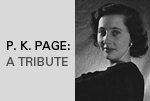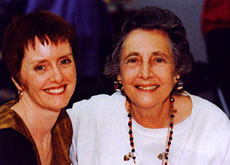My first awareness of P. K. Page came via Gary Geddes. As my creative-writing teacher at the University of Alberta in 1977, he recommended that I hone my craft with her at UVic's Department of Creative Writing, where I enrolled in September 1978. Unbeknownst to Gary and to me, she had decided not to continue teaching, after only one year. Nevertheless, she was the lure that led me to a series of experiences and decisions that would make me the poet I am today.
My next encounter with her was, of course, through her work. In a UVic English class with Eli Mandel in 1980, he asked his students to write pastiches of two poems by a Canadian poet. I chose to write in the manner of P. K.'s "A Bark Drawing" (my poem is called "Hieroglyph") and "Personal Landscape" (mine is "Shared Landscape"). Through this act of mimicry, I learned a great deal about, and rapidly came to respect, her nimble mastery of startling imagery, apt line breaks, and, most importantly, the knack she had of knotting the thread of a poem with a progression of stimulating ideas.
It was only when I assumed my position of editor of The Malahat Review that I became acquainted with her personally. Within a month of my return to Victoria after a twenty-year absence, she invited me to her home for a drink. It's then I came to know a little of the fully engaged mind and exacting woman behind the poems. I also greatly benefited from her open support of me as editor and was very grateful when she would, on occasion, compliment me on an issue and especially for the tribute issue we published in honour of Robin Skelton, the magazine's founder. This meant a great deal to me, for she was also very candid about the fact that no love had been lost between them.
Since I became editor, I've made a point to read each of her new books, and her prolific output of titles in diverse genres in her last years has made this both a delight and a challenge. I am a great fan of Hand Luggage: a Memoir in Verse, The Filled Pen (essays), and Coal and Roses (her second book of glosas, a form that she inaugurated as a now still-vibrant trend in Canada). She will continue to inspire me as a poet, both in her work and in her example. Her engagement with ideas, verse forms, and the language sets a high standard. I look forward to rereading her and, fingers crossed, to a cornucopia of posthumous books.


 John Barton
John Barton


